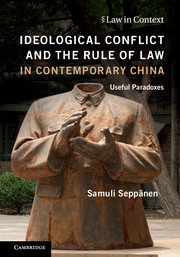Book contents
- Frontmatter
- Dedication
- Contents
- Foreword
- Preface and acknowledgments
- 1 Introduction
- 2 Setting the stage
- 3 Ideological cynicism meets theoretical skepticism
- 4 Useful paradoxes: the conservative socialist ideological position
- 5 Thick mainstream, thin liberalism and vice versa
- 6 Avant-garde renewal and nostalgia
- 7 Conclusions
- Textbook answers to the questions in Chapters 1–6
- Bibliography
- Index
3 - Ideological cynicism meets theoretical skepticism
Published online by Cambridge University Press: 05 July 2016
- Frontmatter
- Dedication
- Contents
- Foreword
- Preface and acknowledgments
- 1 Introduction
- 2 Setting the stage
- 3 Ideological cynicism meets theoretical skepticism
- 4 Useful paradoxes: the conservative socialist ideological position
- 5 Thick mainstream, thin liberalism and vice versa
- 6 Avant-garde renewal and nostalgia
- 7 Conclusions
- Textbook answers to the questions in Chapters 1–6
- Bibliography
- Index
Summary
Which of the following statements concerning the relationship between law and politics is incorrect?
A.Law and politics are constrained by and react to economic relations.
B.Politics influences and constrains law.
C.Law confirms, regulates and influences politics.
D.Law is in a dominant role in the relationship between law and politics.
– Preparatory Material for the Public Examination for the Recruitment of Provincial (City and County) Level Public Institution Staff, 21.Some realism about ideological realism
Before turning to the analysis of specific ideological positions, it may be helpful to demonstrate the limits that certain existing traditions of social theory present for achieving the objectives of this book. This chapter makes two simple points: (i) many social theoretical arguments about the rule of law are best understood in terms of their social effects; and (ii) an awareness of this fact should make any interpreter of the Chinese rule of law discourse skeptical about attempts to interpret it – or the “rule of law,” for that matter – through a single social theoretical tradition. This chapter makes these points in conjunction with a discussion of ideological cynicism. As was suggested in the introductory chapter of this book, ideological cynicism is a salient feature of the Chinese rule of law discourse. The reason for this is easy to understand: a consistent, uncompromising ideological slant one way or another (but especially toward liberalism) may have serious adverse consequences for a scholar's career. As a consequence, there is a suspicion within Chinese legal academia that Chinese legal scholars do not make their true opinions about the rule of law known. There is also a conception, held by liberal and conservative-minded Chinese legal scholars alike, that the ideological doctrines of socialist countries (including the People's Republic of China) are particularly disingenuous. The neoconservative Professor Jiang Shigong, for instance, points out that in the course of the twentieth century many of the socialist countries “adopted constitutions more radical in their protection of human rights than Western countries to prove the superiority of socialism over capitalism.”
- Type
- Chapter
- Information
- Ideological Conflict and the Rule of Law in Contemporary ChinaUseful Paradoxes, pp. 52 - 71Publisher: Cambridge University PressPrint publication year: 2016



